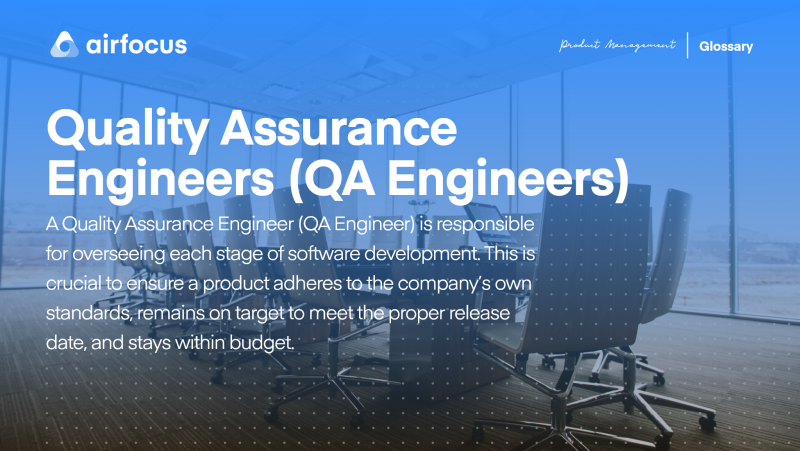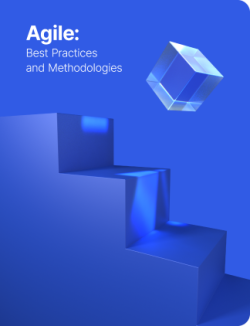Quality Assurance Engineers (QA Engineers)
What is a software quality assurance engineer?
Quality Assurance Engineer definition
A Quality Assurance Engineer (QA Engineer) is a key player in the software development and distribution lifecycle. QA engineers ensure every aspect of a product adheres to the organization’s specified quality standards and requirements before a release.
What is the role of a software quality assurance engineer?
Quality assurance engineers work alongside product managers, project managers, and developers to ensure quality is maintained at every software development and distribution lifecycle stage.
QA engineers are strategic
QA engineers help with project planning, resource allocation, and scheduling. At the start of product development, QA engineers ensure that the requirements are clearly defined and communicated. They are on the lookout for contradictory or unclear requirements and look ahead for problems that may arise due to unreasonable requirements.
Once the requirements for a product are defined, QA engineers develop and implement processes to verify the final product will adequately meet those specifications. They anticipate problems and check quality throughout the development process to quickly resolve issues or avoid them entirely.
QA engineers work with project managers to ensure they give enough resources and time to each stage of development to allow proper incorporation of quality assurance processes. They may also recommend additional training or equipment so that developers have the skills and tools to create quality products.
QA engineers are curious
QA engineers are always asking, “What if…?” It’s not enough to check that a product performs properly under perfect circumstances. QA engineers ask what happens if the product isn’t used properly. They wonder how software will act if the power fails, if an unauthorized user gains access, or if 10,000 users all log on at once.
QA engineers think creatively
QA engineers develop tests that demonstrate how a product will react under expected and unexpected circumstances. They run these tests to find bugs (where software doesn’t meet requirements under normal circumstances) and vulnerabilities (where software doesn’t meet requirements under unexpected circumstances).
QA engineers are conscientious and proactive
QA engineers must be confident enough to call, “Stop!” or raise a hand when there’s a bigger problem. They won’t just sweep a potential issue under the rug. If they find an issue and can’t resolve it within the scope of the project, they need to help product managers and project managers balance priorities. This is especially important when tensions appear between budgets, schedules, and quality.
What happens day-to-day?
The day-to-day life of a QA Engineer can be varied and exciting. They are often a bridge between stakeholders and developers, interacting with various development team members. From strategic planning meetings with product owners, to one-on-one sessions with developers to understand an issue with the product, QA engineers will constantly be communicating.
QA engineers will spend a substantial portion of time on various testing phases on a day-to-day basis.
Designing Tests. These must demonstrate at each stage that products meet all the requirements in both expected and unexpected scenarios. QA engineers thoughtfully design tests to identify issues and, if possible, pinpoint their underlying cause.
Executing Tests. Running the designed tests and documenting the results allows QA engineers to confidently communicate the results to project stakeholders.
Analyzing Tests. QA engineers analyze the test results for unexpected outcomes and ascertain if any areas have not been assessed. QA engineers document, analyze, and reliably reproduce issues so that future tests can ensure the problems are fully resolved.
Enhancing Tests. Testing is a learning process, and as the testing cycle continues, QA engineers should modify and redesign tests to improve quality.
As well as planned testing, QA engineers need to constantly use and review the product itself to ensure that it meets all the requirements. There is still no substitute for hands-on testing.
A QA Engineer needs to remain aware of the latest best-practice techniques, specifications, and frameworks and consider how to implement them in their own context. So some part of their day is spent on self-development.
What makes a great assurance engineer?
Great QA engineers are detail-oriented but also understand the big picture. Like good chess players, they consider all the options and how each part of the product may impact and influence another part. They balance the pressures of stakeholders with the needs of developers, keeping in mind the end goal of a quality product for release.
Nobody likes someone who only points out problems. The best QA engineers not only find issues, but also consider practical solutions. They are savvy enough coders that they not only understand the bugs and can suggest best-practice techniques to avoid those issues in the future.
Efficiency is key. A great QA engineer designs and implements constant automated processes which test and demonstrate a product's quality without continuous manual intervention. They write up best practices and ensure developers follow these policies to avoid repeating errors. They also know when to test quality, understand where different issues can arise in the development lifecycle, and implement the correct tests at the right time.
What type of education is needed for a career as a quality assurance engineer?
QA engineers usually start out as computer scientists, software developers, or software engineers and then make a move into QA engineering.
The first step is to learn the technical skills of programming and software development. You can learn these skills through a university degree, online training, or work experience. It’s important to choose training or contexts that teach not only coding, but also the best practices of the software development lifecycle.
Many employers do not hire QA engineers based on qualifications but recruit likely candidates from their existing pool of developers. So, the next step is gaining experience as a software developer as part of a development team. When employers hire QA engineers, they look for developers with the strategic and communication skills we described above. They may then offer further training and specialization.
What is the job potential for a quality assurance engineer?
QA engineers in the US can expect to make between $57,000 and $108,000 a year, depending on their location and experience. The median annual salary is around $82,000.
QA engineers can continue pursuing their technical careers by becoming QA team leads, business analysts, and even Chief Technology Officers (CTOs).
Another career path is to grow on the strategic side and pursue project management and/or product management.

General FAQ

Glossary categories
Experience the new way of doing product management

Experience the new way of doing product management







